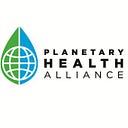PHAM2022: Together Again after COVID19
European Hub Travel Scholar
Being chosen as a PHAM2022 Travel Scholar threw open an ethical dilemma typical of the Anthropocene and Planetary Health — the environmental damage of a long-haul, international flight weighted against the infinitely more social and effective experience of meeting, planning, discussing, debating and finding solutions in person.
A key discussion during the COVID19 lockdowns was how lack of in-person meetings, conferences and events might impact existing and future networks. Concern was particularly acute amongst earlier career academics who worried about missing two years of events, and if this might disadvantage them in building networks independent of their universities and supervisors. Such concerns had been one of the main topics of conversation during May’s informal European Hub gathering at the Geneva Health Forum in Switzerland (to which most of us travelled by train), and so opportunities to meet in person once again — or in many cases, for the first time in person after months of online interaction with people who had become friends in spite of the challenges — was not to be missed.
For me, PHAM was a working meeting with three aims: present my posters (on links between climate change and the emergence of antibiotic resistance in India; and the emergence of mutual aid networks for food provision during pandemic lockdowns in the UK); take forward discussions on Planetary Health education curricula through the regional hub Working Groups; and to report on recent activity and future plans of the European members. The latter took place before ‘handing over’ the European organisation from the informal North European Hub that emerged from the 2018 PHAM in Edinburgh, UK and the 2018/19 World Health Summits in Berlin, to the more formal European Hub Secretariat that will take it forward. With regret that the first European meeting, planned for June 2020 in Amsterdam, was curtailed by the pandemic, it is heartening to know that many of us have now had the chance to visit ARTIS, and that there will be many more opportunities to come. The Dutch group will give the European Hub an excellent steer.
The pandemic both closed down and opened up borders. Travel restrictions prevented us travelling to Amsterdam for the planned 2020 meeting, or to Kenya for a research project on childhood nutrition undertaken with the University of Eldoret — excellently completed by Melvine Anyango and her colleagues following remote training and copious hours on Zoom! — but also enabled greater engagement between the many national European groupings: with student groups in Germany and France; with emerging groups in Oslo; more established groups in Berlin and across Germany, the Netherlands, Spain and Italy; and with subject-specific groups interested in Mental Health, Policy and Geopolitics. These moved faster in cyberspace than we would have under ‘normal’ travel conditions, and enabled us to share resources, online lectures, summer schools and seminars across the world. Most ‘European’ Hub activity expanded far beyond Europe’s borders.
As we exit the pandemic, unpack the complex causal chains that led to it and the health inequalities that exacerbated it, and try to identify and learn lessons from it, Planetary Health is more important than ever. COVID19 could be just the short, sharp shock the Anthropocene needs to kick-start the Great Transition.
